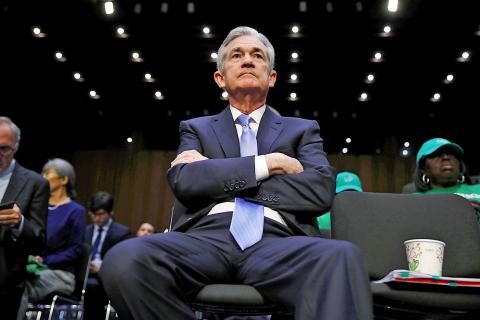The US Senate on Tuesday approved US President Donald Trump’s selection of Jerome Powell to be the next chairman of the Federal Reserve beginning next month.
US senators voted 84-13 to confirm Powell to lead the nation’s central bank, a post that is considered the most powerful economic position in government.
Powell is to succeed Janet Yellen, the first woman to lead the Fed, when her term ends on Feb. 3.

Photo: AP
Trump decided against offering Yellen a second four-year term as chair, despite widespread praise for her performance since succeeding Ben Bernanke.
Powell, 64, has served for five-and-a-half years on the Fed’s board. A lawyer and investment manager by training, he will be the first Fed leader in 40 years without an advanced degree in economics.
Many expect him to follow Yellen’s cautious approach to interest rates.
Powell, viewed as a centrist, enjoyed support from Republicans and Democrats.
The 13 senators who voted against Powell’s nomination included four Republicans, eight Democrats and US Senator Bernie Sanders, an independent who votes with the Democrats.
The vote total was initially announced as 85-12, but US Senator Dianne Feinstein received permission to change her vote to no after the initial count had been announced.
One of the dissenters, US Senator Elizabeth Warren, said she was concerned that Powell “will roll back critical rules that help guard against another financial crisis.”
However, Senator Sherrod Brown, the top Democrat on the Senate Banking Committee, praised Powell’s tenure on the central bank board.
“His track record over the past six years shows he is a thoughtful policymaker,” Brown said.
During the presidential race, Trump was critical of the role the Fed played in implementing the Dodd-Frank Act, the 2010 law that tightened banking regulations after the 2008 financial crisis.
Trump and many Republicans in Congress contended that the stricter regulations were too burdensome for financial institutions and were a key reason why economic growth since the Great Recession ended in 2009 had been lackluster.
Powell has signaled that he favors ways to make bank regulations less onerous, especially for smaller community banks.
Educated at Princeton University with a law degree from Georgetown, Powell spent many years in investment management — at Dillon Read and then at the Carlyle Group.
His work there made him one of the wealthiest figures to serve on the Fed board: His most recent financial disclosure form places his wealth at between US$19.7 million and US$55 million — and based on how government disclosures are drafted, his wealth may actually be closer to US$100 million.

The US dollar was trading at NT$29.7 at 10am today on the Taipei Foreign Exchange, as the New Taiwan dollar gained NT$1.364 from the previous close last week. The NT dollar continued to rise today, after surging 3.07 percent on Friday. After opening at NT$30.91, the NT dollar gained more than NT$1 in just 15 minutes, briefly passing the NT$30 mark. Before the US Department of the Treasury's semi-annual currency report came out, expectations that the NT dollar would keep rising were already building. The NT dollar on Friday closed at NT$31.064, up by NT$0.953 — a 3.07 percent single-day gain. Today,

‘SHORT TERM’: The local currency would likely remain strong in the near term, driven by anticipated US trade pressure, capital inflows and expectations of a US Fed rate cut The US dollar is expected to fall below NT$30 in the near term, as traders anticipate increased pressure from Washington for Taiwan to allow the New Taiwan dollar to appreciate, Cathay United Bank (國泰世華銀行) chief economist Lin Chi-chao (林啟超) said. Following a sharp drop in the greenback against the NT dollar on Friday, Lin told the Central News Agency that the local currency is likely to remain strong in the short term, driven in part by market psychology surrounding anticipated US policy pressure. On Friday, the US dollar fell NT$0.953, or 3.07 percent, closing at NT$31.064 — its lowest level since Jan.

Hong Kong authorities ramped up sales of the local dollar as the greenback’s slide threatened the foreign-exchange peg. The Hong Kong Monetary Authority (HKMA) sold a record HK$60.5 billion (US$7.8 billion) of the city’s currency, according to an alert sent on its Bloomberg page yesterday in Asia, after it tested the upper end of its trading band. That added to the HK$56.1 billion of sales versus the greenback since Friday. The rapid intervention signals efforts from the city’s authorities to limit the local currency’s moves within its HK$7.75 to HK$7.85 per US dollar trading band. Heavy sales of the local dollar by

The Financial Supervisory Commission (FSC) yesterday met with some of the nation’s largest insurance companies as a skyrocketing New Taiwan dollar piles pressure on their hundreds of billions of dollars in US bond investments. The commission has asked some life insurance firms, among the biggest Asian holders of US debt, to discuss how the rapidly strengthening NT dollar has impacted their operations, people familiar with the matter said. The meeting took place as the NT dollar jumped as much as 5 percent yesterday, its biggest intraday gain in more than three decades. The local currency surged as exporters rushed to